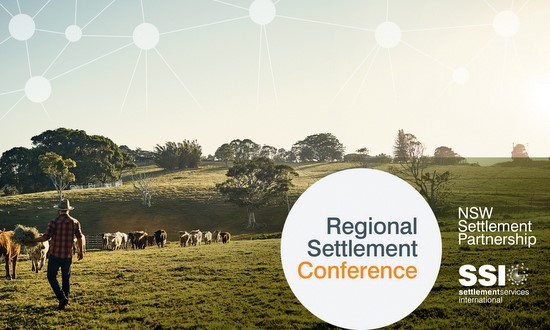The Regional Settlement Conference, held on Tuesday, April 12, 2022, harnessed insights and shared perspectives on the key ingredients of successful regional settlement.
The virtual conference, hosted by SSI and the NSW Settlement Partnership (NSP), provided the opportunity to hear not just from service providers but also from the newcomers they have helped.
The conference also saw the release of the NSP’s paper, Insights into Regional Settlement in Practice, with an addendum of additional case studies and policy recommendations.
Insightful panels and discussions explored a wide range of issues, including affordable housing, educational and employment opportunities, and culturally responsive service delivery.
On this page you will find a recording of the event and information and presentations, including:
- The program and speaker profiles
- Sharon Daishe, CEO of NSS, Overview of Regional Settlement
- NSP Panel - Strengthening Settlement Capacity & Social Cohesion
- City of Newcastle CALD Social Network Analysis
- NSP Policy Recommendations and Way Forward

We need a holistic, coordinated approach
Australia is one of the most urbanised nations in the world, with nearly 70 per cent of us living in capital cities. As a result, regional and rural areas often miss out on the social and economic benefits of migration because newcomers are more likely to live in a capital city where there are more employment opportunities, infrastructure and established social connections.
Often this trend is amplified by people moving away from regional areas, driven by more opportunities in the cities.
Migrants often choose to stay in regional and rural areas based on factors including employment, education, lifestyle, availability of services and the warmth of welcome from locals.
Local community attitudes and involvement, and strong social networks within and between communities, are important prerequisites for successful settlement.
Yet regional settlement policy often doesn't consider the local host community conditions or the aspirations of newcomers. As a result, regional areas often lack the specialised health, education, housing and employment services that refugees and migrants need to build their lives.
The NSP's ethos is underpinned by the belief that there is a need for a coordinated, holistic approach to regional development that acknowledges the role refugees and migrants play in reinvigorating regional areas.
Regional migration and settlement policy should seek to align newcomers' aspirations with host community needs and settlement capacities and capabilities at a local level. Newcomers in regional areas should feel empowered to make life choices and shape their future in their new community.
While community engagement and social cohesion are important, there is no substitute for the specialised settlement services and expertise that settlement providers can offer. Robust, adequately funded, and resourced settlement services can help newly arrived people to gain confidence and become self-reliant in a new and unfamiliar environment.

